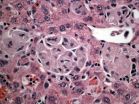(Press-News.org) Outgoing. Assertive. Calm. Practical. Decisive. These are obvious qualities that one would want in their leaders.
But what about, say, arrogant, hesitant, overly dramatic, inflexible, or being a "yes-man"? A new study has found that when it comes to leading, some of those negative personality traits aren't such a bad thing, either.
The work, by researchers in the University of Nebraska-Lincoln's College of Business Administration, studied the development of leaders over a three-year period. Prior research had established that clearly positive personality qualities – such as extraversion, emotional stability and conscientiousness – had helpful effects on both the performance and the development of leaders.
Little attention has been paid, though, to negative, or "dark side," personality traits and whether they are really so bad.
"Mae West told us that when she's good, she's good. But when she's bad, she's even better. We chose to investigate so-called subclinical or 'dark side' traits because we really didn't know much about how and to what degree they affected performance or development," said Peter Harms, assistant professor of management at UNL and the study's lead author. "Was it possible that they might be beneficial in some contexts? For some of them, it turns out that the answer was yes."
The study found, for example, that being overly skeptical was uniformly bad for performance and development. But having a very cautious or hesitant nature was associated with both increased performance and developing leadership skills over time.
The study tracked more than 900 officer cadets in their second, third and fourth years at the U.S. Military Academy at West Point. It used the Hogan Development Survey, a comprehensive measure of subclinical traits, to predict changes in a variety of leadership areas that were regularly assessed in developmental reviews at the Academy.
Several of the 12 "dark side" traits – such as those associated with narcissism, being overly dramatic, being critical of others and being extremely focused on complying with rules – actually had a positive effect on a number of facets of the cadets' leadership development over time.
"By themselves, these subclinical traits had fairly small effects, but when aggregated, they played a substantial role in determining which cadets developed leadership skills," Harms said.
"Assumptions about how these traits affected performance and development were mistaken … it appears that even negative characteristics can be adaptive in particular settings or job roles."
That's not to say that large doses of these traits will make someone a great leader. "Dark side" traits have always been considered to be adaptive up to point, Harms said. Even moderate amounts can be dismissed as personality quirks by co-workers and subordinates. But at extremely high levels, the characteristics become pathological and can lead to career derailment, Harms said. Leaders must be sensitive to their situation to understand when exactly they are going too far.
For example, narcissists perform exceptionally well in job interviews, where self-enhancement and self-confidence is expected, but their tendency to put themselves ahead of others and take too much credit can lead to friction among co-workers.
Workers who are very precise and rule-adhering may be considered noxious in sales or marketing divisions but may be considered normal or even high-functioning in accounting or legal departments.
The authors cautioned that the study's results might be unique to the military context for which the cadets were training. But the findings do prove that it isn't necessarily bad to be "bad," and that more research is needed to fully understand the role of subclinical traits in the workplace.
The findings also could be used to tailor executive training programs and leadership intervention programs to employees' unique, individual needs.
"Organizations should take these 'dark side' traits into account when making decisions concerning training and promotion," Harms said.
###
The article, which appears in a forthcoming edition of The Leadership Quarterly, was authored by UNL's Harms and Seth M. Spain along with Sean T. Hannah of the Center for the Army Profession and Ethic at the United States Military Academy.
END
WASHINGTON, D.C., October 19, 2010—In response to a study regarding fish oil use during pregnancy published in the October 19 issue of the Journal of the American Medical Association (JAMA), the Council for Responsible Nutrition (CRN), the leading trade association for the dietary supplement industry, reminds pregnant and lactating women of the undisputed importance of consuming the recommended amounts of docosahexaenoic acid (DHA) throughout pregnancy. This can be done by eating two servings of fatty fish, such as sardines or anchovies, per week, or taking fish oil supplements ...
The 2010 Nobel Prize in Physics went to the two scientists who first isolated graphene, one-atom-thick crystals of graphite. Now, a researcher with the University of Houston Cullen College of Engineering is trying to develop a method to mass-produce this revolutionary material.
Graphene has several properties that make it different from literally everything else on Earth: it is the first two-dimensional material ever developed; the world's thinnest and strongest material; the best conductor of heat ever found; a far better conductor of electricity than copper; it is virtually ...
Athens, Ga. – When we make decisions based on what we think someone else will do, in anything from chess to warfare, we must use reason to infer the other's next move—or next three or more moves—to know what we must do. This so-called recursive reasoning ability in humans has been thought to be somewhat limited.
But now, in just-published research led by a psychologist at the University of Georgia, it appears that people can engage in much higher levels of recursive reasoning than was previously thought.
"In fact, they do it fairly easily and automatically," said Adam ...
ANN ARBOR, Mich. – Millions worldwide die each year because they can't afford a pacemaker. Meanwhile heart patients in the United States say they'd be willing to donate theirs after death to someone in need.
In the current issue of Circulation, experts at the University of Michigan Cardiovascular Center examine the legality and logistics of collecting pacemakers, after they are removed for burial or cremation, for sterilization and reuse across the globe.
Small humanitarian efforts have shown reusing pacemakers is safe and effective with little risk of infection and ...
Researchers at Yale School of Medicine have found that new disease pathways involving more than one cell type leads to Type 1 Gaucher disease, a rare genetic disorder in which fatty substances called glycosphingolipids accumulate in cells, resulting in liver/spleen enlargement, osteoporosis, bone pain, and increased risk of cancer and Parkinson's disease.
The new findings could lead to less expensive and more effective ways to treat the disorder, which affects about 1 in 50,000 people in the general population. Those of Eastern and Central European (Ashkenazi) Jewish ...
A new report issued by the International Osteoporosis Foundation (IOF) for World Osteoporosis Day puts the spotlight on the severe impact of spinal fractures and calls on health professionals to recognize the signs of these fractures in their patients.
"The widespread under–diagnosis and lack of treatment of spinal fractures, leaves millions of people around the world with chronic pain, deformity, disability and at high risk of future fractures," says Professor John Kanis, President of the IOF.
As many as two-thirds of spinal osteoporotic fractures are not recognized ...
GOLDEN, Colo. (October 20, 2010) – A new independent study by HealthGrades of patient outcomes at America's hospitals found that patients at 5-star rated hospitals had a 72% lower risk of dying when compared with patients at 1-star-rated hospitals -- an enormous gap that has held steady over the past years even as overall mortality rates have improved. According to the study, if all hospitals performed at the level of 5-star rated hospitals over the three years studied, 232,442 Medicare lives could potentially have been saved.
Released today, the Thirteenth Annual HealthGrades ...
Nagoya, Japan, 20 October 2010– The economic importance of the world's natural assets is now firmly on the political radar as a result of an international assessment showcasing the enormous economic value of forests, freshwater, soils and coral reefs, as well as the social and economic costs of their loss, was the conclusion of The Economics of Ecosystems and Biodiversity (TEEB) report launched today by TEEB study leader, Pavan Sukhdev.
"TEEB has documented not only the multi-trillion dollar importance to the global economy of the natural world, but the kinds of policy-shifts ...
For the month of October, BookWhirl.com features the book The Healers by Thomas Heric and author Cheryl Madeleine Lodico. The featured book, The Healers by Thomas Heric is a suspense thriller about the dark future of health care. The featured author is retired teacher, Cherul Madeleine Lodico, who successfully fulfilled her dream of being an author.
The Healers is the first book in Thomas Heric's new series. Set in the year 2021, The Healers introduces the mysterious Aesculapian Healers who offer complete cures of most illnesses with a money-back guarantee. The main ...
1on1 Boxing Fitness, Mesa's premier boxing and fitness facility, fighters Terry Bam Bam Perkins, Miguel Alverado, Breenan Killa B Macias and Geovanni Canizales will compete this Wednesday and Thursday at the two-day Copper Gloves tournament at the Arizona State Fair.
"I hope to bring home four Copper Gloves champions, these fighters have been training hard leading up to this fight" said 1on1 Boxing Fitness Owner, certified conditioning specialist and former professional boxer Christopher Terry. "I expect each one of these guys' unique fight style to come out strong and ...


